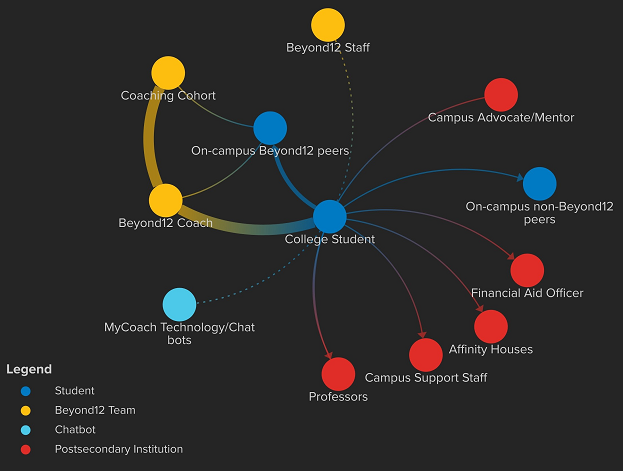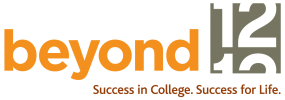Beyond 12
Snapshot
Beyond 12 is a nonprofit that supports low-income, first-generation, and historically underrepresented students through college using a longitudinal student tracking platform and a personalized student coaching service.
Relationship Map 

This Kumu map illustrates the web of relationships put within reach for students. Thicker lines indicate strong relationship ties (daily to weekly contact). Dotted lines indicate weak relationship ties (less frequent contact).
Stronger Ties
Beyond 12 near-peer coaches and coach cohorts.
Weaker Ties
On-campus non-Beyond 12 and Beyond 12 peers, postsecondary institution staff, and Beyond 12 staff.
Key Design Insight
Using a Co-Active Coaching Model, the Beyond 12 coach and student are active collaborators. The relationship is treated as an alliance between two equals for the purpose of meeting students’ needs.
How Beyond 12
builds social capital
Beyond 12 builds students’ social capital through a personalized coaching service aimed at addressing discrete barriers to successfully navigating and graduating from college. Beyond 12’s near-peer, virtual college coaches broker strong relationships with students. Coaches advise students on how to find opportunities to forge personal and professional connections on campus and beyond. In addition, Beyond 12’s “MyCoach” mobile app helps students manage key deadlines and connects them to fellow students and valuable campus resources. Beyond 12 operates a longitudinal data analytics engine that tracks and informs student-coach engagement and provides rich insights to education administrators on how to better support students.
The Beyond 12 Coaching Experience
As a student, the key relationship that Beyond 12 offers is an ongoing relationship with a near-peer college coach. Unlike some other student support models, by design, this coach is not there to intervene on behalf of the student. Coaches are rarely directly connected to other people in students’ lives, nor does the coach serve as a broker to directly introduce students to new people or on-campus supports. As the Kumu diagram arrows above indicate, students, rather than the Beyond 12 team, are the ones reaching out to forge connections.
Instead, Beyond 12 coaches aim to help students unlock their own potential and to understand when and how to forge connections on campus and beyond. In the organization’s own words, the coach is there to “empower students to build their capacity to become aware of their choices and support them in acting from this place of understanding.” Specifically, the Beyond 12 approach uses the Co-Active Coaching Model, which originated in the executive coaching field. According to this model, “Co-Active refers to the fundamental nature of a coaching relationship in which the coach and client are active collaborators. This relationship is an alliance between two equals for the purpose of meeting the client’s needs.”
In practice, this means Beyond 12 coaches work to forge a trusting, one-on-one relationship with students and then, over the course of a number of years, work through a series of activities designed to empower students to know themselves and to activate networks of support and opportunity to achieve their goals.
Beyond 12 coaching is fully virtual, conducted through regular outreach via phone, video chat, email, text, and social media. Coaches provide 1:1 guidance to students starting at the end of their high school career through the end of their second year of college. This outreach corresponds with a Beyond 12-developed curriculum geared toward building students’ capacity to successfully navigate college as different challenges of the college-going experience arise. Students access the curriculum through the organization’s proprietary MyCoach App and log their progress through the curriculum with their coaches during bi-monthly calls.
Relationships Built
Near-peer coaches: Using the Co-Active Coaching Model, recent college graduates provide 1:1 virtual guidance to students from the end of high school through their sophomore year of college (caseload is approximately 1 coach: 125 students). Although dosage varies student to student, according to Beyond 12, “On average and based on our model, coaches spend about one hour talking on the phone with students each month (a 30-minute call every two weeks). In the interim, coaches also communicate through text message and email conversations with their students for an estimated additional 30 minutes per student each month. This additional coordination time increases to an average of one hour per student each month when coaches support students with resumes, cover letters, and internships during late winter and early spring months.
Postsecondary institution staff: Coaches keep track of how often and when students engage with staff at their colleges. Although Beyond 12 coaches don’t function themselves as brokers on campus—they are not, in other words, connecting students to additional relationships—the Beyond 12 curriculum includes numerous junctures for coaches to urge students to activate relationships offline. Specific network-expanding activities within the curriculum that coaches keep track of include students (1) meeting with their financial aid officer and knowing that financial aid officer’s name; (2) attending office hours with professors at least twice per semester in two of their courses; (3) visiting the career center at least twice; and (4) visiting the academic advising center at least twice per semester.
Peer relationships: Beyond 12’s curriculum includes a specific core content area focused on “Networking and Building Social Capital.” The goal of the lessons in this content area is to emphasize to students that “building and nurturing relationships is critical to creating opportunities for success” and that “to successfully manage varied and diverse relationships, it is important to calibrate frequency, familiarity, and interacting style.” Within these networking lessons, students are encouraged to form connections with classmates who could serve as potential job or internship references and study group partners.
Although Beyond 12 does not create formal peer cohorts on campus, when the opportunity and need arises, Beyond 12 coaches may also make efforts to connect students they are serving on the same campus to each other. Anecdotally, however, Beyond 12 knows that students have begun either discovering other Beyond 12 students on their own campuses with whom they have shared experiences, or are now sharing what they are learning with their peers who do not themselves have access to Beyond 12 coaching and supports.
Design Tools & Tips
Transcending institutional supports. Although Beyond 12 accesses revenue from institutions, the app is designed to follow students rather than institutional clients. As Senior Director of Data Eve Shapiro notes, “When you centralize all supports within single institutions, what happens for students moving among institutions? Those networks and supports disappear. At Beyond 12, we follow students and we help them build networks and mentor relationships both intra- and extra-institutionally.”
High-trust, low-stakes supports. As Beyond 12 founder Alex Bernadotte notes, some students can feel ashamed of telling partner organizations, particularly those furnishing students with scholarships, that they are struggling because of the sense that “these people have invested so much in me.” The goal of the Beyond 12 coaching model is to offer someone with whom students feel a high degree of trust but who is not high stakes because coaches are not attached directly to their communities, support networks, or scholarship programs.
Data analytics based on real interactions. Beyond 12 is starting to use analytics to drive recommendations for coaches on which students to prioritize and how. These analytics are based on many cycles of analog coaching that Beyond 12 has tracked since its inception.
Measuring Social Capital
Beyond 12 constantly tracks student-coach relationships through engagement measures and monitoring regular check-ins. The MyCoach App also captures data on students’ progress throughout the school year as they make their way through the Beyond 12 curriculum. The majority of data on students’ relationships beyond their coach is captured through coaches logging their interactions and student feedback directly into Salesforce. To specifically gauge progress on leveraging support and building networks, coaches log data on whether students have successfully been able to:
Identify a campus advocate or mentor
Identify three peers who can serve as references
Create at least one study group with engaged, high-performing peers
Engage in extracurricular activities
Coaches also capture the extent to which students are using campus resources (such as tutoring, health centers, and counseling services) and whether students are successfully obtaining internships and jobs.
Notable Results
85%Students Beyond 12 has coached for four years that have either graduated or are still enrolled in college. |
2xStudents Beyond 12 has coached remained enrolled in or graduated college at twice the national average for similar students. |
More Case Studies
Cajon Valley Union School District
Cajon Valley Union School District is a public school district that provides K–12 students with career-related learning, guided by its World of Work career development framework and curriculum.
Future Focused Education
Future Focused Education is a nonprofit that supports underserved students through policy change efforts; a network of industry-focused charter schools; and school redesign efforts aimed at providing students with 360-degree support, real-world experiences, and paid internships.
StreetWise Partners
StreetWise Partners is a nonprofit that leverages mentorship to increase employment opportunities for adults from overlooked and under-resourced communities.


